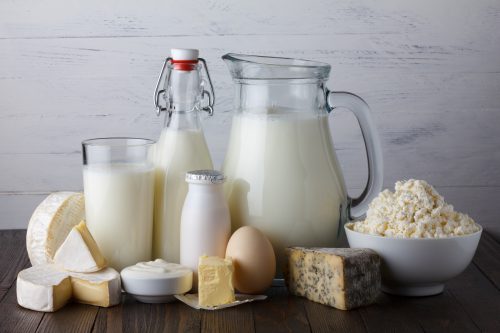
Surveys show that most New Zealanders aren’t getting enough calcium. Are you?
Teen years
- Daily needs, ages 9-11: 1000mg
- Daily needs, ages 12-18: 1300mg
Why is calcium so important at this age?
During these years, bones develop quickly and are storing calcium so your skeleton will be strong later in life. In fact, nearly half of all bone mass is formed during these formative years.
Take note
The last National Nutrition Survey found teenagers’ average calcium intakes were well below the recommended amount, at 60 per cent for girls and 74 per cent for boys. This can lead to osteoporosis later in life.
Ages 20-50 years
- Daily needs 1000mg
Why is calcium so important at this age?
Our peak bone mass is achieved by around age 25, so maintaining calcium intake and promoting bone strength is vital. While you can’t build more bone by increasing your calcium intake, you can help prevent bone loss by maintaining a good intake of calcium and exercising regularly.
Take note
Calcium needs bone-friendly vitamin D to help with absorption, so spend a few minutes in the sun each day (before 11am and after 4pm). If you’re pregnant, breastfeeding or have irregular periods, speak to your doctor – you may need to increase your calcium intake.
Ages 50-70 years
- Daily needs, men: 1000mg
- Daily needs, women: 1300mg
Why is calcium so important at this age
In New Zealand, osteoporosis affects one in two women and one in three men over the age of 65. Women in particular are at higher risk, due to the hormonal changes associated with menopause.
Take note
Use it or lose it! Include weight-bearing exercise such as walking or resistance training in your weekly routine to keep your bones strong. Also, limit your intake of sodium, and be sure to eat foods rich in potassium (like bananas and sultanas) – it’s linked to higher bone mineral density.
Age 70 years and older
- Daily needs: 1300mg
Why is calcium so important at this age?
When you’re over 70, your risk of developing osteoporosis is higher than at other times in your life.
Take note
In addition to all the other bone health advice, it’s important to speak with your doctor or physio about minimising your risk of falls.
As we move into our senior years, looking after our bones is crucial. While women lose bone density rapidly after menopause, by age 65-70 both men and women lose bone density at the same rate. Calcium absorption also decreases with age in both men and women so it is important not only to keep your calcium intake high, but to ensure you are getting sufficient amounts of vitamin D.
Vegetables, fruit and bone health
Did you know that vegetables and fruit help build and keep bones strong? Researchers have found that people who eat the most vegetables and fruit have denser bones. Vegetable and fruit intake seems important for strong bones at all ages in both men and women.
So why is this? Some vegetables and fruit contain calcium, although not in exceptional amounts, but they also contain other nutrients crucial for bone health. Potassium has been termed ‘the unsung bone protector’ and is present in large amounts in vegetables and fruit. Potassium works together with magnesium and these minerals are important because they help to neutralise the acid created during the normal digestive process – a process that usually draws minerals such as calcium out of bones, reducing their strength. Other nutrients from vegetables and fruit such as vitamins K and C plus provitamin A (eg. beta-carotene) also help with building and maintaining bones.
Vegetables and fruit contain a range of phytochemicals with bone health-promoting properties. These compounds have a different mode of action to calcium so their promotion of bone health could be complementary. Compounds that may have a benefit include flavonoids in plums, oranges and onions and lycopene from tomatoes. – Carolyn Lister, Plant & Food
Can bone loss be reversed?
Bone mass starts to decline in your mid-20s, but you can slow or help prevent bone loss from occurring later in life. Getting your bone density and strength tested by your doctor is a good first step, as it can identify the onset of osteoporosis (when bones become less dense, and break more easily due to calcium loss) or osteopaenia, a milder form of bone loss. Exercise also helps keep bones strong.
Calcium coming from food sources, especially dairy, is your best bet when it comes to increasing your intake, but you may need to boost your levels with calcium supplements as well. Consult with your GP before adding calcium supplements to your diet.
Calcium content of common foods
Click the DOWNLOAD button below for a PDF chart, that you can also print out for easy reference.
www.healthyfood.com










